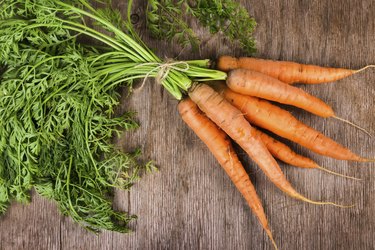
As a root vegetable, carrots stay fresh longer than many other vegetables. But sometimes you can't get to them before they turn soft and rubbery, so you may try freezing carrots. While blanching before freezing is the best way, you can freeze unblanched carrots.
Simple Method for Freezing Carrots
Video of the Day
You could just take some carrots, tops and all, and stick them in the freezer — bam, frozen carrots. But when you thaw them to use in your favorite recipe, they are likely not going to have as good a flavor and texture as if you freeze them properly.
Video of the Day
The widely recommended method for freezing most vegetables is to first blanch them — or submerge them in a pot of boiling water for a few minutes — then cool them in an ice bath, dry them and pack them in airtight containers. According to the Academy of Nutrition and Dietetics, this helps to preserve the color, flavor and texture of fresh vegetables by reducing enzyme action. It also delays the loss of nutrients that can also happen with freezing and rids the surfaces of dirt and bacteria.
However, blanching is a process that not everyone wants to go through, and that's OK. Having the right containers is extra important, though. Vacuum seal storage containers that allow you to remove the air via a pump are your best bet, but they can cost a pretty penny. Heavy duty freezer bags can work nearly as well if you manually remove as much air as possible.
Wash and dry your carrots thoroughly, then slice, dice or chop them any way you want. Think about how you'll use them — for soups, sliced or diced carrots fit the bill, but for stir-fries you might prefer julienned matchsticks. If you will be using them for multiple purposes, store the different cuts in separate containers.
A Few Freezing FAQs
You might be surprised to hear that frozen vegetables are just as nutritious as fresh — and sometimes more so. Vegetables lose nutrients when they are exposed to air and light, so freezing them at the peak of freshness can preserve nutrients lost when produce sits on store shelves or in your fridge past its prime. And, you can't beat the convenience of having fresh vegetables on hand — even those that are out of season — whenever you want them.
Frozen foods that are kept at consistent below-freezing temperatures last indefinitely, but that doesn't mean they will retain their quality. The National Center for Home Food Preservation says that it is best to use frozen vegetables within eight to 12 months after freezing, although sooner is better.
Unblanched frozen vegetables may have an even smaller window of time in which they maintain their quality. Keep track by clearly labeling the containers with the date before popping them in the freezer.
You might enjoy crunchy carrots in a salad, but thawed, raw carrots are likely not best for that use. Blanched or not, the texture of vegetables changes when they are frozen. Frozen vegetables are best for cooked dishes such as soups, stews and stir-fries. Some frozen vegetables can even be roasted with good results.
Raw carrots don't carry the same risk of foodborne illness as many other foods, such as raw chicken; however eating raw veggies does still pose a considerable risk. According to the Centers for Disease Control and Prevention, almost 50 percent of foodborne illnesses are caused by bacteria on fresh produce.
Freezing inactivates bacteria, yeasts and molds on vegetables, but it does not destroy them, reports the USDA. Once thawed, the microbes can become active again and multiply in favorable conditions. Therefore, freezing unblanched carrots is not a substitute for washing them thoroughly.
Read more: The 18 Most Nutritious Vegetables